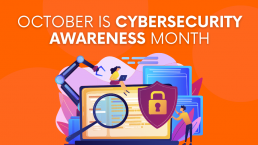Avoiding Cybersecurity Pitfalls in the Cloud and Email Security

Cybersecurity Awareness Month – Securing Cloud and Email for Today’s Business
October is Cybersecurity Awareness Month, making it the perfect time to focus on strengthening security practices for critical business tools like cloud storage and email. As more companies rely on cloud-based systems and digital communication, securing these channels has become a top priority. This post will explore the essentials of cloud and email security, along with tips to avoid common pitfalls that put businesses at risk. By taking proactive steps, you can safeguard your sensitive information and prevent data breaches.
Why Cloud and Email Security Matter for Businesses
For many businesses, the cloud offers convenient storage, easy file sharing, and remote access, while email remains a crucial communication tool. However, these conveniences come with security risks. Cybercriminals are increasingly targeting cloud accounts and email systems, making it critical to implement strong security measures in both areas.
- Cloud Security: Storing data in the cloud introduces risks such as data leakage, unauthorized access, and account breaches. Proper security protocols are essential for keeping your data safe.
- Email Security: Email remains one of the top attack vectors for phishing, malware, and ransomware. Without email security measures, businesses are more vulnerable to cyberattacks that can lead to data loss and financial damage.
Email Security Essentials
Effective email security involves a combination of technical safeguards, employee training, and best practices. Here’s how to secure your email systems:
- Enable Multi-Factor Authentication (MFA): MFA adds an extra layer of security by requiring users to verify their identity through a second factor, such as a one-time code sent to their phone. This significantly reduces the risk of unauthorized access.
- Implement Strong Spam Filters: Advanced spam filters can help detect and block suspicious emails before they reach your inbox, reducing the chance of phishing attacks.
- Conduct Phishing Awareness Training: Employees are often the last line of defense. Regular training on how to spot phishing emails and handle suspicious messages can prevent many attacks. Companies like KnowBe4 specialize in security awareness training, helping teams stay vigilant.
Best Practices for Cloud Security
Securing your cloud storage is just as important as securing your email. Here are some essential practices for keeping your cloud data safe:
- Control Access Permissions: Only give access to those who need it, and regularly review permissions to ensure they’re up to date. This minimizes the risk of unauthorized access.
- Encrypt Data: Both data in transit and at rest should be encrypted. This ensures that, even if a hacker gains access, the data will be unreadable without the encryption keys.
- Monitor for Suspicious Activity: Many cloud platforms offer monitoring tools to detect unusual behavior, such as unexpected login locations or large data transfers. Setting up alerts for suspicious activity can help you respond quickly to potential breaches.
How Perception Point Can Enhance Email Security
Email security is a major focus of Cybersecurity Awareness Month, and Perception Point offers an advanced solution. Their technology scans email attachments and links in real time, detecting potential threats and blocking them before they can reach your inbox. This proactive approach is invaluable in the fight against email-based threats, providing an extra layer of defense against phishing, malware, and more.
How to Choose the Right Cloud Security Tools
Selecting the right cloud security tools depends on your business’s unique needs. Here are a few factors to consider:
- Integration: Look for solutions that integrate smoothly with your existing platforms and workflows, making them easier to manage.
- Scalability: As your business grows, your security needs may change. Choose tools that can scale with your organization.
- Compliance: If your business operates in a regulated industry, such as healthcare or finance, ensure that your cloud provider and security tools comply with relevant standards like GDPR, HIPAA, or PCI-DSS.
Protect Your Cloud and Email Accounts This Cybersecurity Awareness Month
Cybersecurity Awareness Month is a great time to review your organization’s cloud and email security practices. By implementing robust safeguards like multi-factor authentication, encryption, and security training, you can protect your business from cyber threats and data breaches. Take advantage of advanced solutions like Perception Point to enhance email security, and remember – the key to strong cybersecurity is a proactive approach. Let this October be a starting point for more secure, resilient online practices that protect your data and your business.
